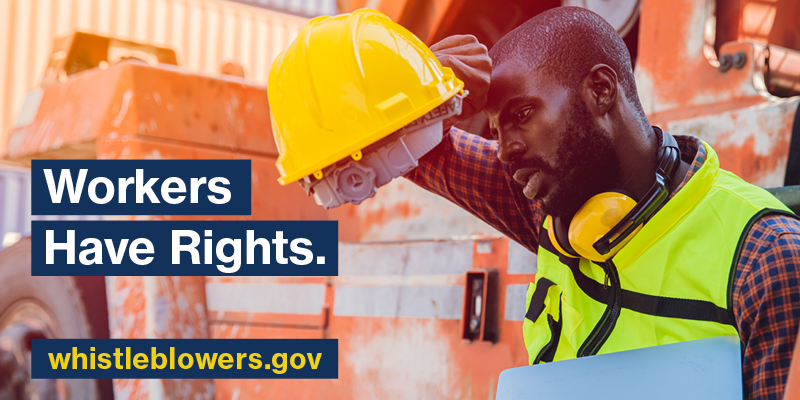
In Spring 2021, two workers employed by a San Jose transport company expressed safety concerns to their employer before starting their shift. They reported being too sick and tired to drive safely and felt they couldn't operate commercial vehicles. How did their employer respond? The multimillion-dollar company issued disciplinary points to the two drivers, which led to the termination of one worker.
The whistleblower division of the U.S. Department of Labor’s Occupational Safety and Health Administration investigated and found that the employer violated the Surface Transportation Assistance Act, one of more than 20 whistleblower statutes we enforce. We ordered the company to reinstate the fired employee and remove disciplinary points from their records. In addition, we ordered the company to train managers, post a notice informing their employees of workers’ protection rights under federal law, and revise company policy to comply with the Surface Transportation Assistance Act.
Under federal law, workers have the right to raise concerns if they believe their rights are being violated in the workplace.
Similarly, the statute enforced by the department’s Mine Safety and Health Administration provides strong protections for miners. Under the Federal Mine Safety and Health Act of 1977, miners have the right to report hazardous conditions and can refuse to work in unsafe conditions. Miners may not be fired, demoted, harassed, intimidated, transferred, denied employment, discriminated against, or suffer any loss of wages for exercising their rights under the Mine Act. These critical protections allow miners to actively participate in the safety of their workplace, and MSHA takes enforcement of hazard and discrimination complaints seriously.
And similar rights apply to pay concerns, too – if employers don’t pay workers all the wages they’ve earned, they can speak up without fear of retaliation. The department’s Wage and Hour Division enforces laws on the federal minimum wage, overtime pay, recordkeeping and child labor requirements, as well as laws about working conditions and payment for migrant and seasonal agricultural workers. The division protects workers’ rights to family and medical leave, too. All workers protected by any of the laws that the division enforces is protected by their anti-retaliation provisions.
View our online resources to determine whether a particular law applies. We enforce the law regardless of a worker’s immigration status and can communicate with workers in more than 200 languages.
National Whistleblower Appreciation Day
As we recognize National Whistleblower Appreciation Day on July 30, we celebrate all the brave workers, like these drivers, who speak out against unsafe or unfair working conditions, and thank them for their contributions to ensuring safer, more just conditions for themselves and their co-workers. Because of their actions, lives and livelihoods have been saved.
The U.S. Department of Labor is committed to protecting every worker’s right to speak up without fear of retaliation if they are mistreated, denied their rights or concerned about safety. Unfortunately, we know that many workers are not protected by their employers when they speak up and need a place to turn if they’re punished, lose their job or are simply afraid to say something directly to their employer.
Employers who retaliate against workers not only break the law but also create unsafe, unfair work environments. Acts of retaliation can include reducing pay or work hours, firing or suspending workers, discipline or demotion, harassment or intimidation, and blacklisting from future hiring.
At the Department of Labor, we believe an open line of communication goes a long way in the workplace, and we encourage employers to create an anti-retaliation program to help improve employee engagement.
Report a concern
Learn more about our whistleblower protection programs online, including how to file a complaint, or contact OSHA at 1-800-321-OSHA (6742) with workplace safety or health concerns. Report a mining accident or a hazardous condition at a mine, impoundment, or abandoned mine online or by calling 1-800-745-1553. You can learn more about your wage and hour rights or file a complaint by contacting the Wage and Hour Division online or by calling 1-866-4-US-WAGE (1-866-487-9243).
Chris Williamson is the assistant secretary for the Mine Safety and Health Administration, Doug Parker is the assistant secretary for the Occupational Safety and Health Administration, and Jessica Looman is the acting administrator for the Wage and Hour Division.

 U.S. Department of Labor Blog
U.S. Department of Labor Blog